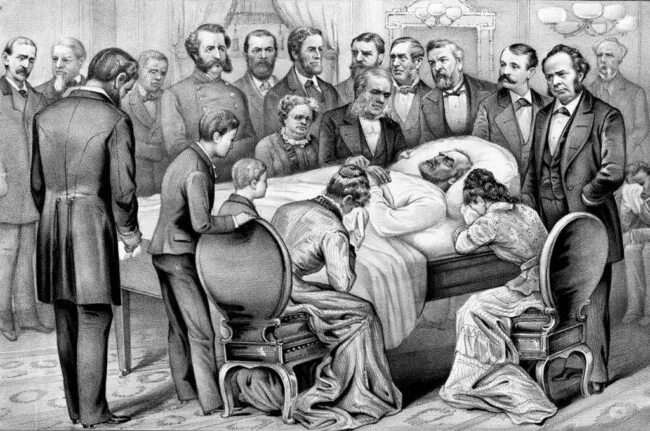
James Garfield was a really cool guy.
He didn’t aspire to the presidency — he became an unexpected compromise candidate. But his Civil War record, and the high respect he had garnered in Congress for his modesty, integrity, intelligence, and dedication to the nation, made him a clear choice in 1880.
He was a strong but compassionate self-made man. He was deeply invested in opposing corruption, in protecting the civil rights of blacks, and in unifying a post-Civil War nation. He stood against the spoils system of governmental appointments, preferring a civil service that protected government from favoritism and partisan politics.

On July 2, 1881, four short months after he took office, he was shot by a disgruntled office-seeker, Charles Guiteau. One wound hittin his shoulder was relatively trival. The key gunshot, deep into his back … still didn’t kill him outright, missing any of his major organs.
Instead, he lingered on for over two months as sepsis slowly, agonizingly, claimed his body with “tunnels” of pus and blood and infection.
And that didn’t have to be the case.
Germ theory was something relatively new, the mid-19th Century work of European scientists like Semmelweis, Snow, Pasteur and Lister. But the demonstrable results of its recommendations had been widely adopted by doctors.
Doctors in Europe.

In America, it was a fancy, newfangled, high-fallutin’, furrin’, totally nonsensical, un-American theory. Invisible creatures causing disease? We all know that’s due to bad air. After all, American doctors were the best there were, trained and hardened of the fields of the Civil War. There was nothing Europe had to teach us.
Besides … the idea of requiring doctors — professionals — to wash their hands before touching their patients? To not wear around their bloodied clothing, which demonstrated their dedication to their manly profession by the “robust stink of the surgery”? To clean their surgical instruments between uses? What sort of creepy, unbelievable, freedom-infringing, effeminate crap was that supposed to be?
So, yeah, Garfield had a serious bullet wound. But he had the finest physicians in the land coming to aid him, to investigate, to treat, to be part of the quest to save the great man’s life.

Exploratory surgery as we know it was out of the question. Doctors knew what to do if the wanted to find out what was going on inside someone, or find a bullet that was lodged within them.
You just stuck your fingers up inside of the body.
Your unwashed fingers, of course.
We know what we’re doing. We know better than those creepy Europeans with their “science” and know-it-all attitudes. They say we’re doing something unsafe. How dare they impose their standards on us? This nation is the greatest on Earth, and we stand for liberty!
Washing hands whenever you touched someone was bothersome. Washing surgical instruments equally so. Using disinfectants like carbolic acid was messy. American doctors treating Garfield declined to follow such namby-pamby recommendations, the so-called scientific discoveries of those Europeans be damned.
And so Garfield died a long, lingering, awful, unnecessary death.
* * *
Today there are still people insisting, against all evidence, that COVID-19 is a triviality, nothing worse than the flu. That not that many people get sick from it, that not that many who get sick actually die. That masks don’t limit the spread of the disease but are a tyrannical infringement on freedom. That vaccines are a conspiracy of foreigners and un-American people trying to force us to do things.
How many James Garfields have there been over the past twenty months, cut down before they could achieve their promise, due to the willful ignorance, stubborn stupidity, and misplaced nationalistic pride of people who reject science for what is convenient or soothing or politically comfortable?
How many more will die?

Do you want to know more?






















